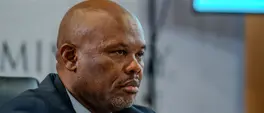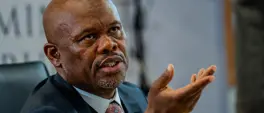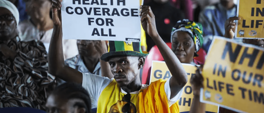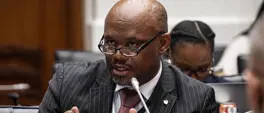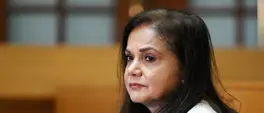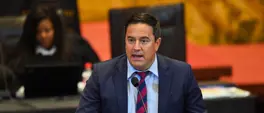COVID, fire, impeachments: Parly closes chapter on eventful 6th administration
Lindsay Dentlinger
21 May 2024 | 17:00The curtain officially comes down on the 6th Parliament at midnight on Tuesday, although it will remain a competent body until the eve of next week’s polls.
CAPE TOWN - The curtain officially comes down on the sixth Parliament at midnight on Tuesday, although it will remain a competent body until the eve of next week’s polls.
Wednesday marks exactly five years since the current cohort was sworn into office.
In some years, it’s been necessary for the president to officially dissolve Parliament when an election date is called before the five-year period has naturally lapsed.
However, this time around, it’s not necessary.
Parliamentary spokesperson, Moloto Mothapo, said, however, despite the parliamentary term ending on the calendar, MPs were not completely off the hook.
"If there’s a need for the National Assembly to meet urgently to deal with any form of business, it will do so. If there’s the need for committees to meet to finalise some of their responsibilities or work, they will do so."
Faced with a pandemic not even a year after being sworn into office, the sixth Parliament has battled all the odds to keep functioning after a fire that ripped through two parliamentary chambers and largely scuppering the return to normalcy after the COVID-19 lockdown.
These factors have made it even more challenging to ensure the meaningful oversight it’s often been criticised about.
In a term of many firsts, last month also saw the resignation of National Assembly Speaker Nosiviwe Mapisa-Nqakula, just weeks before her expected retirement, to face corruption charges.
A PANDEMIC AND A FIRE
The New Year’s fire of 2022 undoubtedly took Parliament to one of its lowest moments since the dawn of democracy and while the governance lapses that led to it coming under attack was a blight on the administration, former ANC MP and ex-South African ambassador, Melanie Verwoerd, said it also taught Parliament how to adapt to new ways of doing business.
"There was less moving around, both by parliamentarians and civil servants, and so money was saved. Time was also saved. And frankly, because of the different nature of the sittings, there was also less fights in Parliament because it was a smaller sitting and fewer opportunities for grandstanding."
Political analyst, Asanda Ngoasheng, said that the ensuing corruption aside, government’s handling of the COVID-19 pandemic should also be lauded.
Despite the lockdown and a parliamentary recess, the relevant Parliament committees convened during this time to deal with issues stemming from managing a pandemic.
"Particularly for a country where we often complain government doesn’t know who’s where and who’s doing what, for the first time, during COVID, we realised that if the government really wanted to, and if needed to, they would be able to track every single South African."
Several opposition parties, however, felt Parliament had been bypassed in the lockdown decision-making.
Parliamentarians were also not unaffected personally by the pandemic, with several MPs succumbing to the virus themselves or losing family members.
IMPEACHMENTS
While it was the fifth Parliament that designed the rules for the removal of a president, following a Constitutional Court judgment, it was the sixth administration that used these rules as a blueprint to draw up the rules for an impeachment process for a Chapter 9 institution.
They were put to the test in 2022 and resulted in the removal of former Public Protector Busisiwe Mkhwebane.
But only months later, the ANC did not approach with the same vigour an independent panel legal report suggesting President Cyril Ramaphosa also face an impeachment inquiry in connection with the scandal on his Phala Phala farm.
That report was rejected just weeks before the ANC’s national conference in December 2022, where Ramaphosa was re-elected as party president.
In February this year, Parliament was faced with another first - the removal of two High Court judges from the bench.
However, barely a month after Mkhwebane’s removal in 2023, she entered Parliament as an MP.
Her presence on a justice committee interviewing panel in March scuppered a process to appoint a deputy Public Protector over a conflict of interest.
Political analysts, however, say given this situation, the new administration should consider the impact of these removals on Parliament in the future and whether a Constitutional amendment might be necessary.
"If you failed as a Public Protector to do the job of holding Cabinet accountable, then how are you fit to hold everybody accountable as a member of Parliament?" said Ngoasheng.
Added Verwoerd: "There is something to be said in relooking whether there’s a case to be made, particularly people in Chapter 9 institutions, or then judges if they had been impeached, whether they should be allowed to stand for Parliament."
While political analysts say, overall, they believe this Parliament did a good job at holding public officials to account through impeachment processes, the Section 194 inquiry in particular took too long and cost too much money.
However, Verwoerd and Ngoasheng believe Parliament did not do enough to hold the president accountable in the same manner.
At the time of wrapping up the term, the National Assembly agreed that gender commissioner Mbuyiselo Botha also face an impeachment inquiry for misconduct.
But it ran out of time to initiate one before his term is due to expire this month.
REBUILDING PARLIAMENT
The start of the seventh administration will be marked by the beginning of the physical rebuilding of Parliament and the expected return to more face-to-face interaction.
But depending on the outcome of next week’s election, it could also see the introduction of independent candidates and a national coalition government.
Verwoerd said Parliament will have to consider how it functions in terms of who gets appointed to chair committees, for example.
"It’s absolutely crucial that Parliament continues to drive accountability towards the electorate. There is sometimes more of a habit to pushing legislation, ignoring public submissions and that must be kept an eye on. And of course, keeping the oversight function very strong both in terms of civil servants and the political actors in Cabinet."
Get the whole picture 💡
Take a look at the topic timeline for all related articles.



